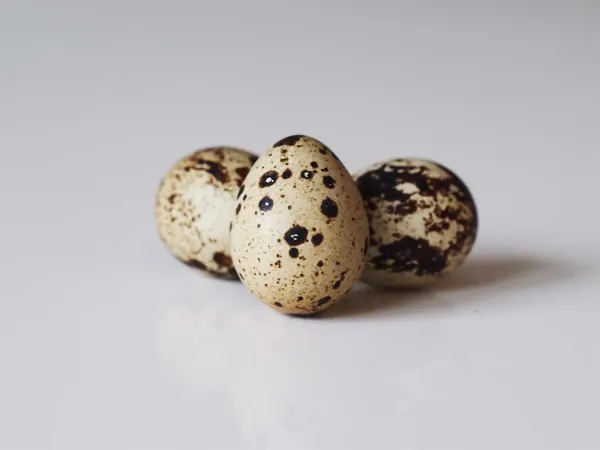Acceda a la base de datos First Foods® en Solid Starts App.
Leer másHuevo de codorniz
Huevo
Sugerencia de edades
6 meses
Alto contenido de hierro
Sí
Alérgeno común
Sí

When can babies eat quail eggs?
¡Lo sentimos, esta página aún no está disponible en español! Estamos trabajando tan rápido como podemos para traducir todo nuestro contenido, gracias por tu paciencia y apoyo.
Eggs (from chicken, duck, and other fowl) may be introduced as soon as your baby is ready to start solids, which is generally around 6 months of age.
How do you prepare quail eggs for babies with baby-led weaning?
Cada bebé se desarrolla a su propio ritmo, y las sugerencias que ofrecemos sobre cómo cortar o preparar determinados alimentos son generalizaciones para una amplia audiencia.
6 to 9 months old:
While you could certainly introduce quail eggs at this age, it’s not worth the work! Focus on bigger, more conventional eggs that you can easily crack into an omelet and save the quail eggs for when your baby is capable of picking up small pieces of food.
9 to 12 months old:
Hard boil them! Hard-boiled quail eggs (or any hard-boiled egg) that are cut in half or quartered are a perfect food for young eaters, and especially for babies in the 9 to 12 month age range, who are working on their pincer grasp (where the thumb and pointer finger meet). Offer hard-boiled quail egg cut in half (or quarters if you feel more comfortable with even smaller pieces).
12 to 24 months old:
Continue with hard-boiled quail egg cut in half. Consider adding them to curries and other dishes to boost the nutrition.
Plunging the boiled eggs into an ice water bath immediately after boiling should help the shells peel more easily.
¡Lo sentimos, esta página aún no está disponible en español! Estamos trabajando tan rápido como podemos para traducir todo nuestro contenido, gracias por tu paciencia y apoyo.
For more information on how to cut food for babies, visit our page on Food Sizes & Shapes.
Videos
Are quail eggs a common choking hazard for babies?
They can be if served whole as hard-boiled eggs. To reduce the risk, quarter the cooked eggs or slice in half.
For more information, visit our section on gagging and choking and familiarize yourself with common choking hazards.
Are quail eggs a common allergen?
Yes. Eggs are among the top food allergens—second only to milk. Fortunately, many children outgrow egg allergies.
When you are introducing eggs to your baby, it’s recommended to start with a small quantity, for example, one small slice of a plain omelet. Some babies have severe reactions to even the smallest amount of eggs, so watch carefully for signs of an allergy or sensitivity. Allergic reactions vary, from watery eyes, hives, rashes, wheezing, itching, facial swelling, coughing, vomiting, diarrhea, and tummy cramps. If the reaction is severe, and/or if your baby is flushed or having trouble breathing, call 9-1-1 immediately, as your baby may be experiencing anaphylactic shock.
While fear of food allergies seems to be at an all-time high, modern science is demonstrating the benefits of introducing food allergens as soon as your baby is ready to start solids. For more detailed information on how to introduce common food allergens, check out our guide, Introducing Allergens to Babies.
Are quail eggs healthy for babies?
Yes! Eggs are a terrific source of fat and protein, plus they contain lots of iron and even some zinc—two nutrients that babies need to thrive. In fact, eggs (particularly the yolks) contain all vitamins (with the exception of vitamin C) and quail eggs have tons of selenium and B-vitamins, especially vitamin B12. Eggs are also one of the best sources of cholesterol and choline—two important nutrients for bone building, brain development, and cellular growth. Best of all: eggs are one of the only food sources of vitamin D, which helps our bodies absorb calcium to power bone growth.
Eggs are one of the most nutritious foods that you can give to your baby, but be careful that they are fully cooked before serving. Eggs may contain salmonella, which can result in a bacterial disease in the intestinal tract.
Escrito y revisado por los/las siguientes especialistas
Consejos de expertos directo a tu bandeja de entrada
¡Suscríbete y recibe correos semanales con recetas, consejos y más!
Copyright © 2026 • Solid Starts Inc

